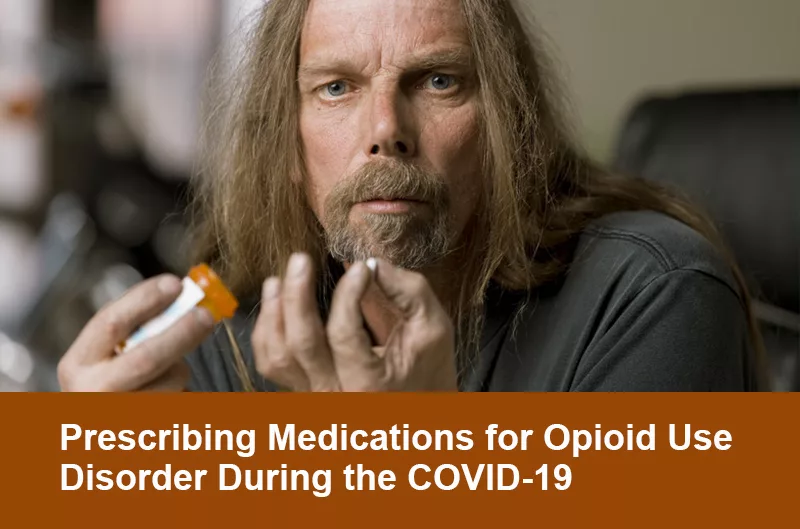Buprenorphine and methadone, the cornerstones of treatment for opioid use disorder (OUD), are subject to more restrictions than other medications due to their inherent risks and concerns for diversion. These restrictions obligate that people receiving medications for OUD present to the clinic or opioid treatment program (OTP) frequently for refills and monitoring. In efforts to minimize in-person health care encounters—to reduce the risk of spreading the illness caused by the novel 2019 coronavirus (COVID-19)—the Substance Abuse and Mental Health Services Administration (SAMHSA) has made some key exemptions to the regulations as of March 2020:
Methadone
Patients starting methadone continue to require an in-person medical evaluation at an OTP prior to starting the medication. However, patients already on methadone can receive their ongoing care via telemedicine visits. Furthermore, given the current national health emergency, OTPs can provide take-home doses for up to 14 days for clinically less stable patients and 28 days for clinically stable patients. The definition of stability is left to the OTP. For example, SAMHSA characterizes those eligible for 14 days as “less stable but whom the OTP believes can safely handle this level of take-home medication.”
Buprenorphine
Patients who are candidates for buprenorphine treatment no longer require an in-person medical evaluation prior to starting the medication. If an authorized health care professional determines that an adequate evaluation of the patient can be accomplished via telemedicine, this is sufficient. Ongoing care can also occur via telemedicine.
Monitoring
Current federal regulations remain that each patient should receive 8 urine toxicology tests per year. However, patients should not be expected to come to the clinic or lab for body fluid testing if they have symptoms of COVID-19 or if they have had close contact with someone who has the infection.
CATR bottom line
Appropriate efforts are underway to promote expansion of treatment for OUD that attempts to meet people where they are at while reducing the spread of COVID-19. Addiction providers should explore telemedicine options that support patients with OUD given recent increases in social isolation, job loss, and anxiety, all of which may worsen the burden of OUD. Work with your patients to create patient-centered strategies for ongoing monitoring. Because patients may have larger than normal doses of methadone or buprenorphine at home, providers should discuss safe storage with patients, provide overdose education, and distribute naloxone.
For further reading, please see: www.samhsa.gov/coronavirus
Methadone
Patients starting methadone continue to require an in-person medical evaluation at an OTP prior to starting the medication. However, patients already on methadone can receive their ongoing care via telemedicine visits. Furthermore, given the current national health emergency, OTPs can provide take-home doses for up to 14 days for clinically less stable patients and 28 days for clinically stable patients. The definition of stability is left to the OTP. For example, SAMHSA characterizes those eligible for 14 days as “less stable but whom the OTP believes can safely handle this level of take-home medication.”
Buprenorphine
Patients who are candidates for buprenorphine treatment no longer require an in-person medical evaluation prior to starting the medication. If an authorized health care professional determines that an adequate evaluation of the patient can be accomplished via telemedicine, this is sufficient. Ongoing care can also occur via telemedicine.
Monitoring
Current federal regulations remain that each patient should receive 8 urine toxicology tests per year. However, patients should not be expected to come to the clinic or lab for body fluid testing if they have symptoms of COVID-19 or if they have had close contact with someone who has the infection.
CATR bottom line
Appropriate efforts are underway to promote expansion of treatment for OUD that attempts to meet people where they are at while reducing the spread of COVID-19. Addiction providers should explore telemedicine options that support patients with OUD given recent increases in social isolation, job loss, and anxiety, all of which may worsen the burden of OUD. Work with your patients to create patient-centered strategies for ongoing monitoring. Because patients may have larger than normal doses of methadone or buprenorphine at home, providers should discuss safe storage with patients, provide overdose education, and distribute naloxone.
For further reading, please see: www.samhsa.gov/coronavirus


_-The-Breakthrough-Antipsychotic-That-Could-Change-Everything.webp?t=1729528747)



